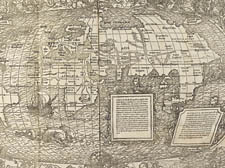|
|
 |
| |

Recovered item:
This map – an engraving of a world map drawn by Hans Holbein the Younger – was taken by Farhad Hakimzadeh from a book with an estimated value of £32,000. |
Priceless pages ripped out of mankind’s history
Paul Keilthy tries to fathom what makes a rich and highly
educated scholar vandalise books he knows to be irreplaceable relics of our human past
MILLIONAIRES with razor blades; robber-geeks.
The British Library, housing the world’s rarest books, attracts some of the world’s stranger criminals.
Farhad Hakimzadeh, sentenced last week to two years’ jail, is the latest in a line of rich men with book obsessions who have targeted the Euston Road archives, excising and smuggling maps, illustrations and rare pages at a cost in cash of hundreds of thousands of pounds.
Over eight years, Hakimzadeh became known as a regular researcher into the 16th-century literature of Eastern exploration, a respected academic who was quietly pocketing the jewels of the Library’s collection. The library is now suing him for £300,000, a figure set to rise.
“You have a deep love of books, perhaps so deep that it goes to excess,” Judge Peter Ader told him at Wood Green crown court on Friday. “I have no doubt that you were stealing in order to enhance your library and your collection.”
Others were not so sure why a 60-year-old collector and company director, a wealthy refugee from the Iranian revolution, should be moved to mutilate perhaps 150 works of art.
The chief police officer in the case, Detective Sergeant Graham Simpson, had seen the Knightsbridge home in which Hakimzadeh had stashed about half of the looted items, some lovingly sewn into his own copies of medieval books.
He spoke with enthusiasm of the exacting forensic methods employed by the library’s researchers to track through more than 800 works accessed by Hakimzadeh between 1998 and 2006. “But,” he added, “as for his motivations, they are completely unknown.”
If the reason for such thefts is obscure, the damage they do is not.
There is a personal note to the statements issued by library staff in these instances, a sense that they as well as the institution they serve have been wounded by the slashes and hacks of bibliokleptomaniacs.
“Libraries require that a bond of trust be honoured between the reader and the institution. Under cover of serious scholarly purpose, Hakimzadeh betrayed the trust,” said Dr Kristian Jensen, head of British collections. “The victims are the researchers of the future who will not be able to consult this material.”
Hakimzadeh has predecessors. When American antique dealer E Forbes Smiley III was exposed as another raider of the library archive in 2006, the British Library submitted a victim impact statement to the American courts.
“Like a drop of oil on a still pond, the number of his victims spreads with time,” it said. “Smiley’s victims include students, scholars, academics, the general public and individuals not yet born.”
Like Hakimzadeh, Smiley was rich and well-informed, with an academic air that gave him access to archives at libraries all over the world. Like Hakimzadeh, he took a scalpel to some of the rarest books on Earth, admitting to 97 crimes after he was caught in the act
in Yale University. He admitted stealing the Apian map, a 1520 map of the world, from a volume once owned by Reformation archbishop Thomas Cranmer, held by the British Library in 2006. The library continues to suspect him of stealing two other valuable maps.
William Jacques was 33 when he was jailed for four years for a spree of library thefts in 2002.
Jacques, a Cambridge graduate and tax accountant, spent the 1990s stealing rare books, mostly from the London Library and Cambridge University Library but also from the British Library. He is thought to have stolen books worth £1.1million.
The thieves are generally caught by chance. A fellow reader noticed something amiss in a book borrowed by Hakimzadeh, triggering a search of the library’s records to identify the scale of thefts; Jacques was caught when a bookseller noticed that one of his stolen volumes was damaged. Smiley dropped his scalpel on the floor in a library reading room.
“Theft from the British Library is an extremely rare occurrence,” said a library statement issued after Hakimzadeh’s sentencing last week. “We have zero tolerance of anyone who harms our collections and will pursue anyone who threatens them with utmost vigour. We continually review and update our security systems, and information obtained through our standard procedures played an important role in securing this conviction.”
For the list of victims for these crimes could be added to for thousands of years to come. |

|
 |
|
 |
|

